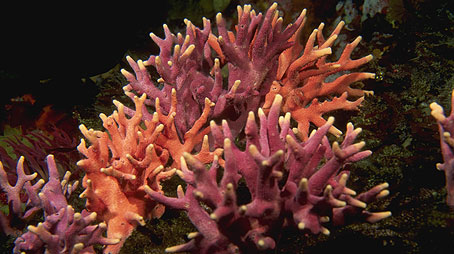| SEARCH |
-

Nov 17, 2015
Reflections on a three-decade legacy
The International Geosphere-Biosphere Programme (IGBP) will come to a close at t...
-
Nov 17, 2015
Use of and access to content on this website
Text and images produced by IGBP in house are free to use with appropriate credi...
-
Nov 12, 2015
Bella Gaia performance and panel discussion to mark IGBP's closure
A musical performance by Bella Gaia will celebrate the achievements and legacy o...
-

Towards Future Earth:
evolution or revolution?
During its three decades of existence, the International Geosphere-Biosphere Pro...
-
A personal note on IGBP and the social sciences
Humans are an integral component of the Earth system as conceptualised by IGBP. João Morais recalls key milestones in IGBP’s engagement with the social sciences and offers some words of advice for Future Earth.
-
IGBP and Earth observation:
a co-evolution
The iconic images of Earth beamed back by the earliest spacecraft helped to galvanise interest in our planet’s environment. The subsequent evolution and development of satellites for Earth observation has been intricately linked with that of IGBP and other global-change research programmes, write Jack Kaye and Cat Downy .
-
Deltas at risk
Around 500 million people worldwide live on deltas, but many of the world's deltas are sinking due ...
-
Climate change: the state of the science
A new data visualization released on the first day of the plenary negotiations at the UNFCCC’s clima...
-
Climate Change:
the State of the Science
Videos now online from the Stockholm public forum to mark the launch of the IPCC's climate report, 2...

Ocean Acidification over time
The main purpose of this FTI was to apply insights gained from paleo-environmental reconstruction and analysis to improve our understanding of the potential consequences for the marine environment of the chemical effects of future CO2 emissions. This FTI helped those working on paleo-environmental studies to understand what kinds of research would have the greatest potential to improve our understanding of the future. Thus, this FTI promoted communication across disciplinary boundaries, allowing cross-fertilization to occur between those working on paleo-environmental problems and those working on problems associated with effects of human activities. It involved participation from SOLAS, IMBER, LOICZ, GLOBEC, IMAGES, IGBP, SCOR and PAGES.
The FTI built on the 2004 SCOR/IOC Symposium entitled The Oceans in a High CO2 World in Paris and the UK Royal Society study on surface ocean acidification
Co-Chairs:
Harry Elderfield (UK), Ulf Riebesell (Germany), Ken Caldeira (USA), Joanie Kleypas (USA), Wally Broecker (USA) and Franck Bassinot (France).
Coordinator:
Executive Director of PAGES: Thorsten Kiefer, IGBP-SC Contact: Bob Duce
Workshops
- “Ocean Acidification - modern observations and past experiences”, Lamont-Doherty Earth Observatory of Columbia University, USA (28-30 September 2006)
- Related ESF-PAGES Workshop: Atmospheric CO2 Ocean Acidification, and Ecological changes in Planktonic Calcifying Organisms, 26-28 September 2007—Barcelona, Spain.
- Related ESF Strategic Workshop on Impacts of Ocean Acidification: 28-30 January 2008, Meloneras, Gran Canaria, Participation of the FTI and inclusion of cross-timescale aspects in their reports.
Products:
Turley, C, Henderiks, J. (2007) Learning from the Distant Past, IMBER Update, 6, 11-13.
Kiefer, T. (2006) IGBP-SCOR Workshop: Ocean acidification—modern observations and past experiences, PAGES News, 14:3, 29-30.
Kolbert, E. (2006) The Darkening Sea, The New Yorker, 2006-11-20, 66-75. (Magazine article of journalist attending the workshop)
Published peer-reviewed articles:
Ridgwell, A, Schmidt, D. (2010) Past constraints on the vulnerability of marine calcifiers to massive carbon dioxide release, Nature Geocience, doi: 10.1038/ngeo755.
From related events:
Ziveri, P. (2008) Understanding Marine Biotic Responses to Fossil Fuel Emissions, Eos, 89:13, 127. (Workshop report ESF- EuroCLIMATE Workshop)
Ziveri, P., et al. (2008) Atmospheric CO2, ocean acidification, and ecological changes in planktonic calcifying organisms, The Eggs, 23. (Workshop report ESF- EuroCLIMATE Workshop)
Kiefer, T., Barker, S., Schmidt, D. and Ziveri, P. (2008) Improving our understanding of the marine biotic response to anthropogenic CO2 emissions, PAGES News, 16:2, 35-36. (Workshop report ESF- EuroCLIMATE Workshop)
Future plans:
- PAGES commits to continuing work on this topic and has included Ocean acidification into Focus 3, “Global ES Dynamics”, of its Science Plan under the Theme “Past perspectives on Ocean Biogeochemistry”
- A paleo ocean acidification group will be formally established in PAGES, to organise collaborative activities in the wider context of IGBP and SCOR, hence following the cross-project, cross-timescale, and cross-disciplinary spirit of the FTI. This will be initiated at the PAGES Open Science Meeting in 2009
IGBP closed at the end of 2015. This website is no longer updated.
-

Global Change Magazine No. 84
This final issue of the magazine takes stock of IGBP’s scientific and institutional accomplishments as well as its contributions to policy and capacity building. It features interviews of several past...
-

Global Change Magazine No. 83
This issue features a special section on carbon. You can read about peak greenhouse-gas emissions in China, the mitigation of black carbon emissions and the effect of the 2010-2011 La Niña event on gl...
-
INTERGOVERNMENTAL PANEL ON CLIMATE CHANGE:
How green is my future?
UN panel foresees big growth in renewable energy, but policies will dictate just how big.
-
UK:
'The Anthropocene: a new epoch of geological time?'
Royal Society, Philosphical Transactions A




















